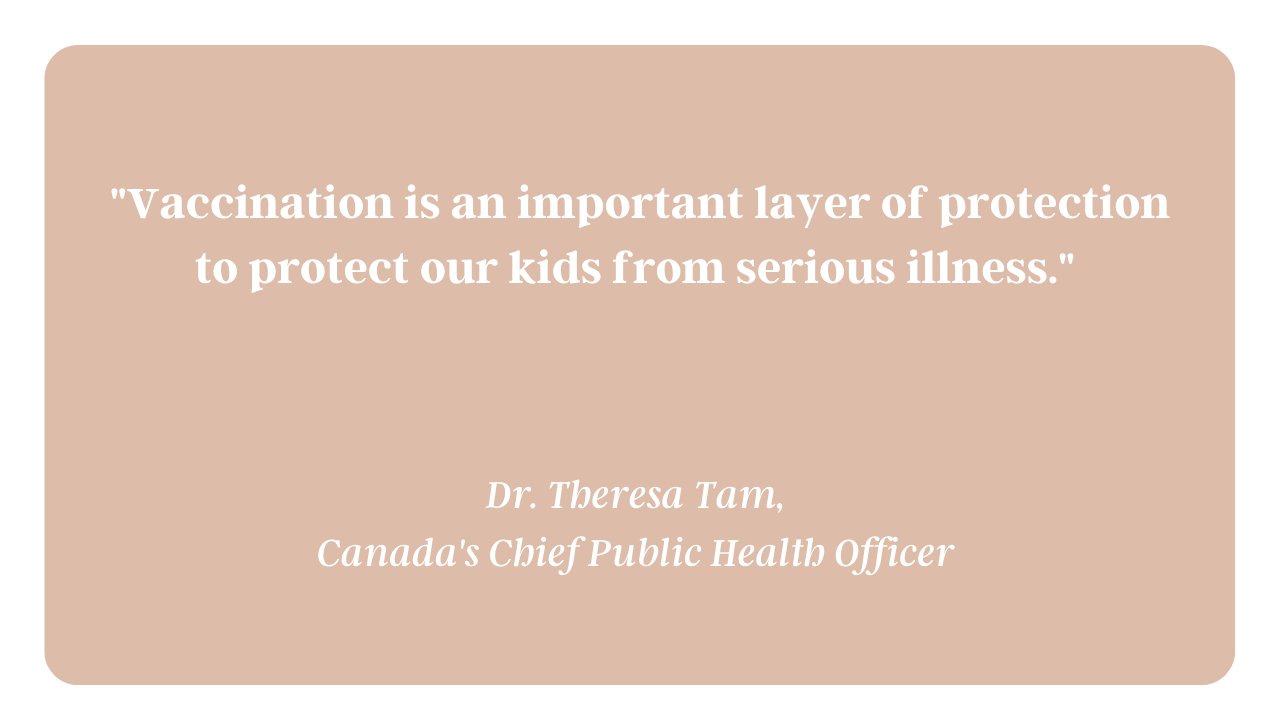COVID-19 vaccines are now available for children as young as six months old. And while some parents have been eager to get their children vaccinated, others have questions. We spoke to Dr. Theresa Tam, Canada’s Chief Public Health Officer and a pediatric infectious disease specialist, to ask her our most pressing questions about the vaccines.
Why should my child get the COVID-19 vaccine?
As the temperature drops, we are more likely to gather indoors, resulting in the increased spread of respiratory viruses, including COVID-19, influenza and respiratory syncytial virus (RSV). This has led to more children getting sick this fall, more overcrowded emergency rooms in many parts of the country, and regrettably, more hospital admissions for young children.
Parents want to do what they can to protect their children and avoid stressful trips to the emergency room. Getting your child vaccinated against COVID-19, as well as influenza, is an important step to help reduce your child’s risk of severe illness and hospitalization.
Since Omicron became the dominant variant of COVID-19, and is more transmissible, the number of children hospitalized and admitted to the ICU with COVID-19 has increased. This includes previously healthy children. Young children under five are also at a higher risk of serious complications from the flu because of their age, since their immune system is still building immunity to fight off serious infections. Vaccines work by training the immune system to recognize the targeted virus and create antibodies to fight off future infection.
While most young children will have mild or no symptoms from COVID-19, some can become severely ill and the long-term effects of infection are not yet known. In addition to staying up to date with recommended vaccinations, we can add layers of protection against COVID-19, such as staying home when sick, wearing a well-fitted mask in crowded places and frequent hand washing. These layers can also help protect against other respiratory illnesses and are most effective when they are all being used. This is similar to using different layers of clothing in the winter, such as hats, scarves and mitts, to protect us from the cold.
Why did the vaccine for COVID-19 take so long to be authorized for the youngest of children?
Safety is always the first priority when a vaccine or drug is authorized for use in children. Vaccines for children were authorized based on their ability to generate an immune response in the body and after meeting high standards of safety as determined by Health Canada. This includes real-world safety monitoring of the vaccines among youth and adults, with billions of doses of the mRNA vaccines administered worldwide. Pediatric vaccines had to undergo specific studies in various age groups to determine the dosage, along with monitoring for safety concerns. In Canada, there has been high uptake of COVID-19 vaccines among those 12 years of age or older, and more than three million children and youth have completed their primary vaccination series.
How do the dose and schedule of the pediatric COVID-19 vaccines compare to older age groups?
Young children under five years of age are given a different formulation of the same type of mRNA vaccines used in other age groups and will receive a smaller dose than older children, teenagers and adults. Depending on the product, they will receive two or three doses at least eight weeks apart. Children with certain medical conditions or taking certain medications that put them at higher risk for serious outcomes from COVID-19 may need to use a different schedule, as their immune responses to the vaccines may be lower. Your health care provider will recommend the appropriate dose and schedule for your child.
Booster doses are authorized and now available for children and teenagers five to 17 years of age and are strongly recommended for those with underlying medical conditions that place them at high risk for severe illness from COVID-19. Six months is recommended between the primary series and the booster dose. Booster doses are not authorized for children less than five years of age at this time.
What side effects could my child have from the vaccine, and how do I manage them?
Millions of children have safely received the COVID-19 vaccines around the world. In Canada and internationally, side effects are regularly monitored and serious reactions to the COVID-19 vaccine in children have been very rare. No new safety signals have been reported after administration of more than 1.5 million doses globally of mRNA COVID-19 vaccines in the six-month to four years of age group.
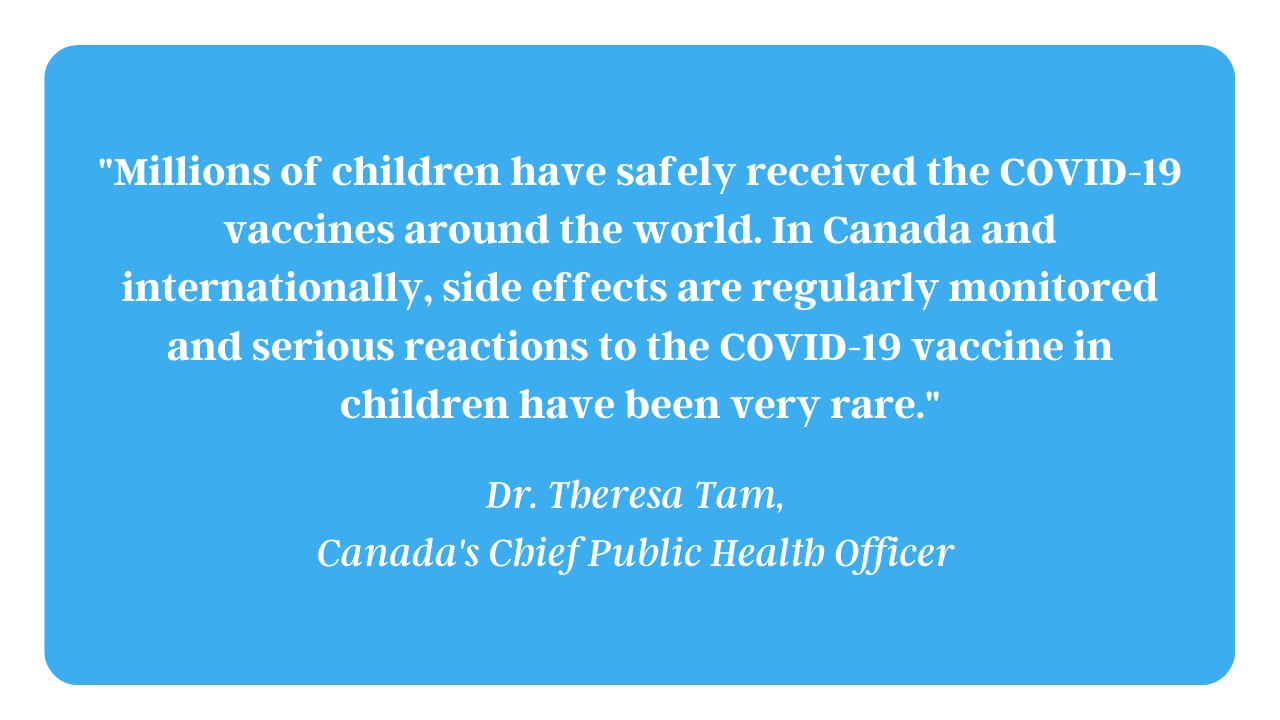
Although not everyone will experience side effects from the mRNA vaccines, there are some side effects that do occur fairly commonly including:
- pain or redness at the injection site,
- tiredness,
- muscle aches and stiffness,
- chills,
- fever, and/or
- enlarged lymph nodes.
It’s important to note that most side effects last only a few days and generally go away on their own. You can manage pain at the injection site with cold compresses. If needed, pain or fever medication may help with side effects. Check with your child’s health-care provider if you need advice about medication for your child or you are concerned about possible side effects.
Inflammation of the heart or the lining on the outside of the heart (myocarditis/pericarditis) has rarely been reported after mRNA vaccines, generally within the first week of vaccination. Among children and youth, the risk is highest in those 12 to 17 years of age but can also very rarely occur in younger children. Seek immediate medical attention if any of the following develops:
- chest pain
- shortness of breath
- fast or irregular heartbeat
How does the risk of side effects of the vaccine compare to the risks of COVID-19?
Children who get COVID-19 are at risk of experiencing multisystem inflammatory syndrome in children (MIS-C), a rare but serious complication that often requires hospitalization. As well, post-COVID-19 condition (also referred to as long COVID) can develop in children after infection. We are still learning more about post-COVID-19 condition in both adults and children.
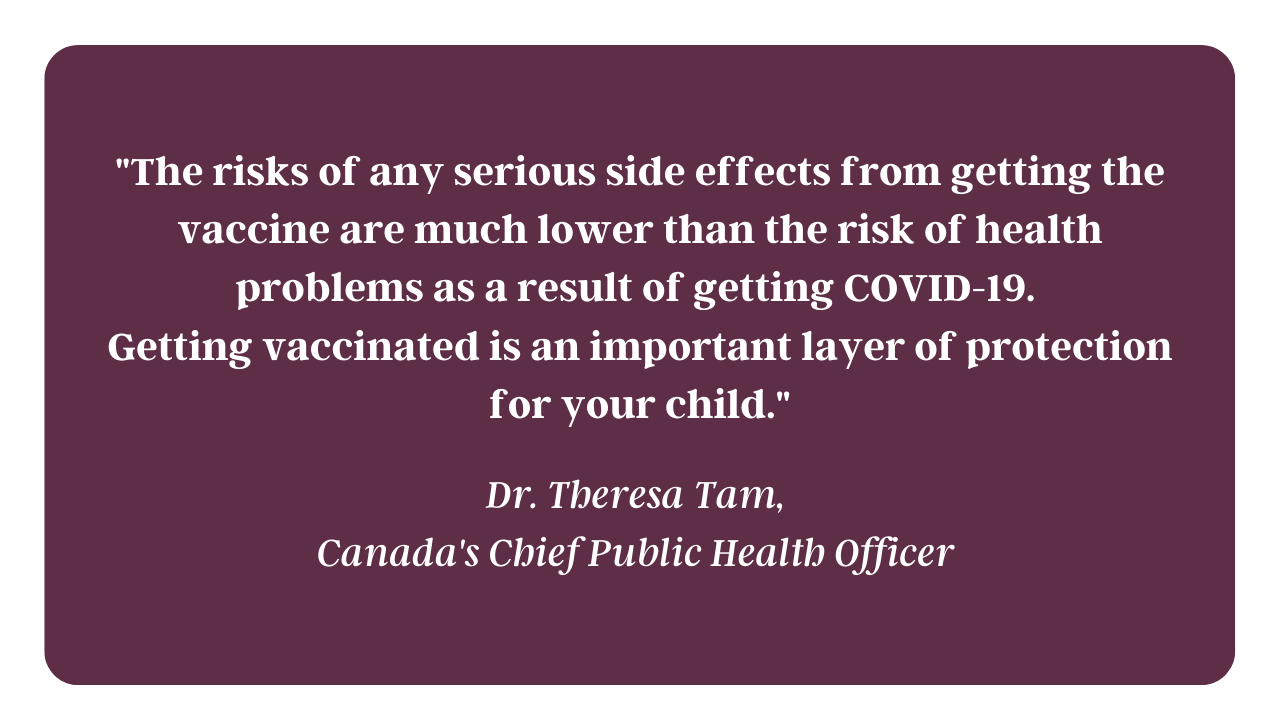
The risks of any serious side effects from getting the vaccine are much lower than the risk of health problems as a result of getting COVID-19. Getting vaccinated is an important layer of protection for your child. This is especially true for children with medical conditions that reduce immune responses or other medical conditions that put them at higher risk for serious outcomes from COVID-19.
My kid has already had COVID-19; should I still vaccinate them?
Children who have already had COVID-19 can still benefit from being fully vaccinated. A COVID-19 infection will provide some protection against future infection for a while, but we’ve seen this protection is better when combined with vaccination.
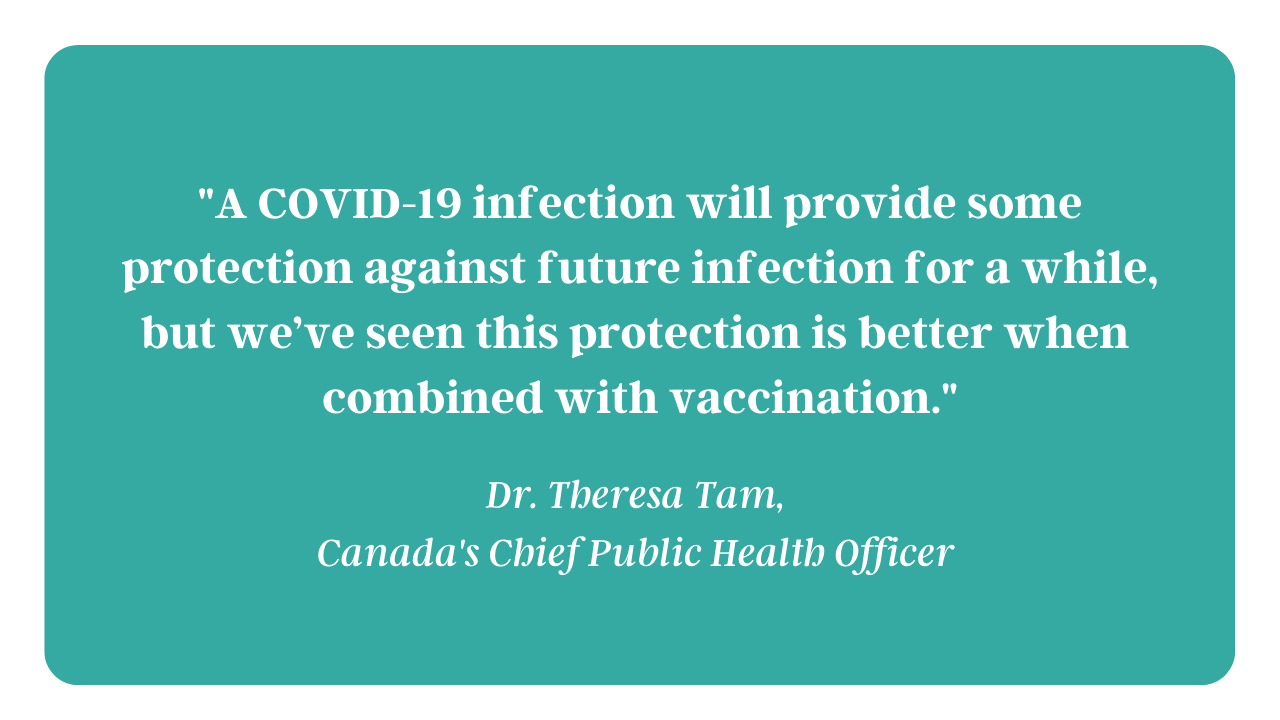
If your child catches COVID-19 before starting or completing their full vaccine primary series, they should wait two months after they tested positive or started to show symptoms before receiving the next dose, according to recommendations from the National Advisory Committee on Immunization (NACI). For children with medical conditions that reduce immune responses, this waiting period from infection to vaccination can be shortened to four to eight weeks. For children five years of age and over, it is recommended to wait six months from infection to receive a booster dose (or six months from the last dose in the primary series, whichever is later).
If I’m pregnant or breastfeeding/chestfeeding, should I get the COVID-19 vaccine?
COVID-19 vaccines are recommended for people who are pregnant, along with other vaccinations routinely recommended in pregnancy, such as vaccines against influenza and whooping cough (pertussis). Vaccination is an important part of a healthy pregnancy, with health benefits for both the person who is pregnant and the baby. This is in line with recommendations from the Society of Obstetricians and Gynaecologists of Canada (SOGC).
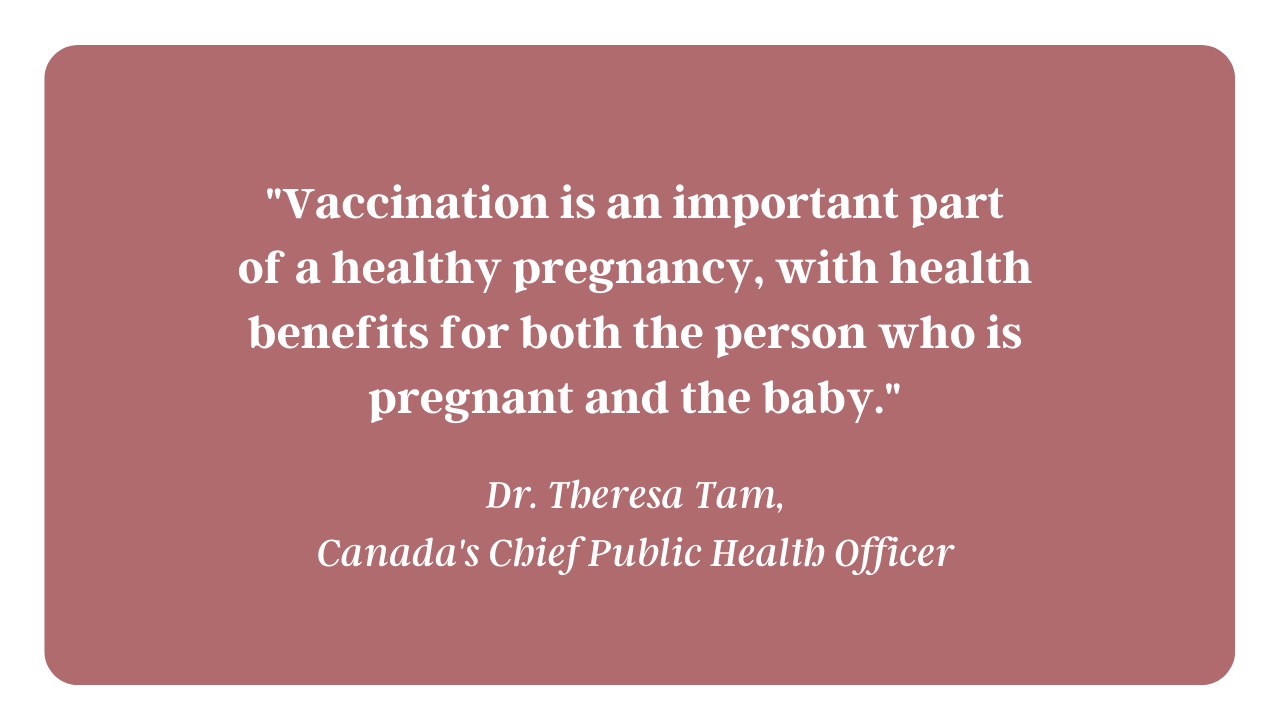
Compared to non-pregnant people, a COVID-19 infection during pregnancy poses a higher risk of complications that can result in hospitalization. As well, COVID-19 infection during pregnancy results in a higher likelihood of pregnancy-related complications, including preterm birth, stillbirth, and low birth weight. COVID-19 vaccination in pregnancy is effective in reducing the risk of serious illness in the pregnant person, including lowering the chances of needing hospitalization and admission to the ICU. Benefits of COVID-19 vaccination during pregnancy can also be passed on to the newborn, providing some level of protection in the first six months of life such as a lower risk of hospitalization with COVID-19 for the baby.
No pregnancy related safety concerns have been identified with vaccinating people who are pregnant. COVID-19 vaccination is also recommended for people who are breastfeeding/chest feeding.

